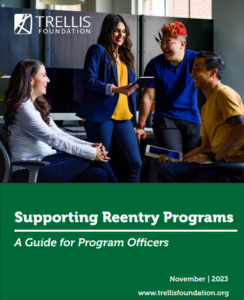As a higher education program officer without a background in the criminal justice or justice reform spaces, I have faced a steep learning curve as the Trellis Foundation expands our work in prison education programs and re-entry education supports.
I imagine you may share my need for guidance. Even if your foundation doesn’t focus on supporting formerly incarcerated individuals, your priority focus likely does. In this guide, we are writing as postsecondary completion funders supporting low-income students and students of color so that we will center these populations. However, any topical area focused on underrepresented populations can likely relate. Do you prioritize more equitable outcomes for historically marginalized populations? Then this guide is for you! Those of us seeking equity of educational outcomes for students of color must recognize their over-representation in the justice system. Supporting educational opportunities for formerly incarcerated individuals is critical to our equity goals.
Fortunately for the Foundation, Alexa Garza joined our team as a graduate fellow. Her lived experience, coupled with her policy advocacy training, has made her an invaluable resource for the Foundation. Through this guide, we hope to share what we have learned with her and help other program officers learn alongside us.
Read the Report >> Supporting Reentry Programs: A Guide for Program Officers
While there is much overlap in the methods and principles of grantmaking for organizations focused on supporting re-entry for formerly incarcerated individuals, the space has some key differences from other work focused on connecting adults to educational and career advancement opportunities. For example, students may experience logistical barriers to their studies based on parole requirements. In addition, the dehumanizing lens that much of society uses toward formerly incarcerated individuals creates unique logistical and psychological barriers.
We are deeply grateful to Alexa for her patience in explaining these barriers and helping us readjust our thinking and our language. Special thanks also to our advance readers: Molly Lasagna (Ascendium Education Group) and Mary Gould (Sunshine Lady Foundation).
We invite you to join us in our quest to improve our support for formerly incarcerated individuals in our communities.
About the Author

Jenny Achilles joined Trellis Foundation (then Trellis Company/ TG) in 2013 with nearly a decade of higher education service in various capacities, including student affairs and study abroad advising. She serves on local and national committees, such as the Funders Collaborative for Higher Education in Prison & Reentry Support, Central Texas Education Funders Network steering committee, the Texas Rural Funders Membership & Dues Task Force, and the Grantmakers for Education Learning, Evaluation and Data Impact Group and Postsecondary Access & Attainment Impact Group. She previously served on the Membership Committee for the National Scholarship Providers Association from 2015-2017. She also leads the board of directors for a nonprofit dance and wellness studio in Austin.
Jenny earned a bachelor’s of science in communication from Lamar University and master’s degrees from the University of Texas at Austin in journalism and public policy, with a focus on nonprofit studies.


